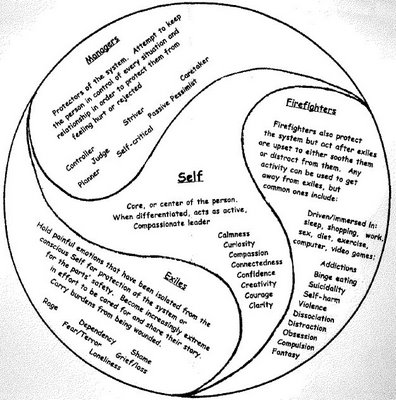
During my coaching sessions, clients often describe different parts of themselves, such as the part that desperately wants to quit drinking and that which aims to sabotage that effort. I became curious as to how these parts affect our behavior. An explanation of how such parts interact is termed Internal Family Systems (IFS). This theory describes an integrative approach to psychotherapy that identifies and works with multiple sub-personalities within each person’s behavioral system. IFS was developed in the 1990’s by family therapist Richard Schwartz, Ph.D., who described the concept of an undamaged core Self that is the essence of who we are. The Self represents the seat of consciousness and demonstrates many positive qualities such as acceptance, confidence, compassion, perspective and courage.
IFS also identifies three different types of sub-personalities that exist within each person. Each part has a positive intent. A central tenet of IFS is that all parts are welcome in the system. Protective parts are divided into our managers and firefighters. Managers are strategic, task-oriented parts that strive to keep us safe and act as our perfectionists, people pleasers, worriers, and inner critics. Protective parts termed firefighters, go to extreme measures to extinguish pain when it is triggered. They are reactive and “act out” with extreme behaviors including addictions or self-harming behaviors in order to prevent our wounded parts from emerging. The third sub-type are the exiles, the young and wounded parts that are burdened with dysfunctional beliefs about their worth and lovability.
Healing occurs in IFS when the personality parts are freed or unburdened from their extreme roles. This occurs when trust in the Self is restored, which then allows the Self to know and understand the other personality parts. The first step in IFS is to learn how to access the Self. Once in a state of Self, one will know how to communicate with each part in order to promote inner system harmony. The goal in IFS is to integrate an individual’s personality components into a balanced behavioral system. IFS is an evidence- based treatment that has been shown to be effective for treating depression, anxiety, phobias, panic disorders and rheumatoid arthritis.
When I came into recovery, I worked with an IFS therapist to help me get to know my exiles. This was helpful in healing that part of myself that felt like she was never good enough and had to always achieve more in order to be acceptable. I since, have taken many IFS classes and apply IFS in my coaching practice. I help my clients see when they are blended with their parts and develop the capacity to separate from their harmful parts. They learn to alleviate the struggle between polarized parts and understand their core concern. This leads to a sense of internal peace and calm.
If you are interested in getting to know about your internal family system, please contact me through my website resiliencerecoverycoaching.com





